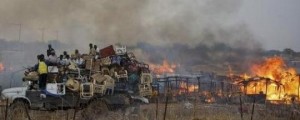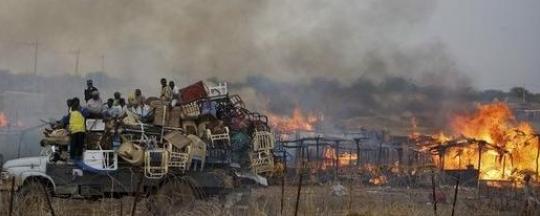Professor Amanda Grzyb, a member of the Sentinel Project’s new Advisory Council recently outlined the situation in the Nuba Mountains region of Sudan in a Globe and Mail op-ed piece that she co-authored with Gerald Caplan. The article, entitled “Is there enough political will to stop Sudan atrocities?,” makes a clear and strong case for international involvement ranging from a ceasefire to armed intervention in order to halt atrocities, protect civilians, and bring perpetrators to justice.

Residents of the Nuba Mountains region of Sudan flee fighting earlier this summer.
Amanda, a media studies professor at the University of Western Ontario, based her article on a draft resolution prepared by the Nuba Mountains Working Group at the recent conference of the International Association of Genocide Scholars (IAGS) in Buenos Aires, Argentina. This working group, of which I was honoured to be a member, put in a lot of extra effort on top of the regular conference program in order to draft a document characterizing the current violence in the Nuba Mountains and warning of the potential for escalation and genocide there. Pending approval by the IAGS membership, this resolution will be a strong tool for anti-genocide advocates.
It should be noted that, as explained in a blog post last month, the Sentinel Project has not declared the Nuba Mountains situation to be a situation of concern due to the ongoing nature of atrocities and our intent to focus on early warning before such killings begin. Nonetheless, we strongly support the work of all those who are pushing for intervention to save lives in Sudan.

